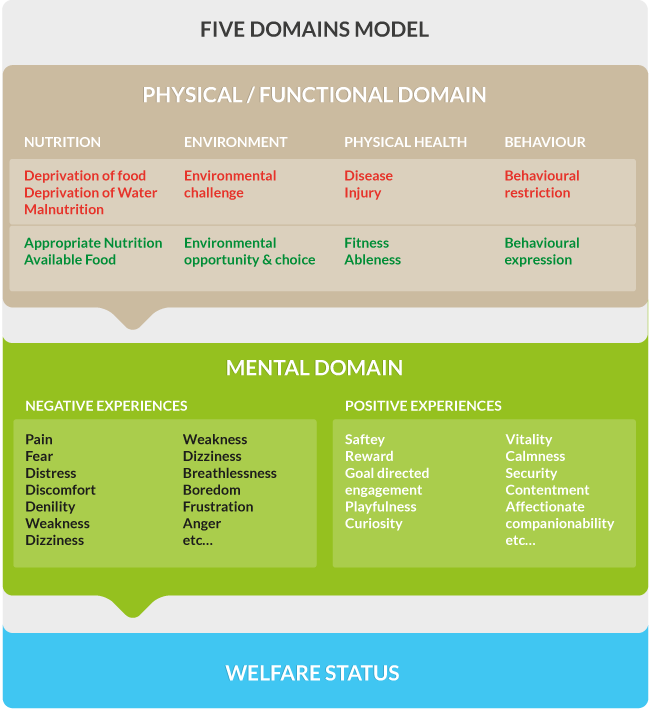WELFARE & LEGISLATION
Measuring Welfare of Captive Wild Animals
To understand what constitutes good welfare in captive animals, we must find a way to successfully assess and measure welfare. This is not always an easy task due to different species and their varying needs, as well as the consideration of their individual needs. However, in more recent years, science-based assessment of animal welfare in captive animals has benefited from increased interest in and research into consciousness, emotions, stress and pain. In the past, the Five Freedoms of Animal Welfare have successfully acted as a foundation, defining and underpinning fundamental animal welfare standards and considerations.
Yet whilst past focuses have been on negative experiences and minimising distress, recent concepts have led to the consideration of positive factors and the development of various positive welfare measures. This encourages the management of animals to promote positive experiences and mental states. The model of the Five Domains of Potential Welfare Compromise has evolved since its original development and illustrates how compromises in an animal’s nutrition, environment, health and behavior can all impact upon its mental state. These five domains may overlap and have combined effects on the overall welfare status of an individual animal and thus The ‘Five Domains’ concept can serve to offer a useful framework for the broad assessment of animal welfare.
With this in mind, implementing management techniques and standards that promote positive physical and mental health for every species accommodated within zoological institutions, whilst also preventing unpleasant experiences for the animal, is fundamental to the care of wild animals in captivity. This can be accomplished by, for example, providing appropriate nutrition to meet the animal’s biological needs which is presented in a manner to satisfy its feeding behaviour requirements, access to con-specifics if appropriate, and access to a complex, variable and stimulating environment providing choice and appropriate challenges, in addition to the continued provision of high standards of both husbandry and veterinary care.
A positive affective state arising from the presence of positive experiences and sensations, with the avoidance of, or minimal, negative experiences, is therefore important to safeguard and ensure good animal welfare and this can be achieved when the physical (nutritional, environmental, health and behavioral) as well as psychological needs are addressed (Mellor 2013, Portas 2013). Although an individual’s mental state and hence its welfare can vary from one point in time to the next as the different sensations it may experience during its lifetime change. (Mellor 2013, Portas 2013), thus, it is the complex interactions between each of the five domains that, in combination, may determine an animal’s overall welfare status.
Five Domains model
In the Five Domains model, the four physical or functional domains (nutrition, environment, health and behavior) are concerned with biological function, or physical wellbeing, and the fifth domain, the mental state, considers the ‘affective state’ or psychological wellbeing. This affective state represents the animal’s overall subjective feelings and experiences and hence this fifth domain is a key element of animal welfare. An animal may have positive or negative emotional states and it is the balance between these subjective experiences that can influence an individual animal’s ‘Quality of Life’ (Mellor 2013).
Animal Welfare Legislation
A vast majority of captive wild animal collections are not influenced by national or international legislation or by codes of ethics or professional best practice. Lack of legislation or proper guidance can lead to poor captive animal management, resulting in a real concern for the welfare and husbandry of the animals within these facilities.
Wild Welfare continues to undertake research into the variety and application of legislative standards around the world, identifying gaps and opportunities within regulatory structures that can support appropriate legislative protection.
We are also addressing the critical captive animal welfare issues that can arise as a result of limited to no legislation protection by working with local experts, NGO advocates and policy stakeholders to identify long term legislative solutions to animal care and protection.
Zoo Accreditation
Some zoological associations have an accreditation system for their member zoos.An accreditation process is usually carried out in an industry body to demonstrate a member’s ability to meet standards. This means they are internally or externally audited on their conservation, education and welfare effectiveness. This system can fill a gap in legislature and in most cases means official recognition and approval of a zoo or aquarium by a group of experts.
Good accreditation can determines who is meeting a highstandard/quality, and represents an assurance scheme standard, differentiating accredited zoos from those that are not. It can support performance benchmarking and underwrite a zoo welfare narrative.
The system therefore helps towards the management and regulation of members, ensuring best practice and a high standard in the fields of conservation, education and welfare. Wild Welfare works with zoo associations around the world to encourage and support effective welfare accreditation is being applied.
Ethical Frameworks & Welfare
Zoos and aquariums are increasingly being required to be as transparent as possible in their animal management practices to their key audiences, whether that be the public, government and sponsors. To establish as a credible zoo or aquarium in the 21st Century, they need to ensure that the positions and practices taken are backed by both sound science and a sound ethical framework.
Science provides us with important facts about animals and the natural world, but can still leave some people asking: “So what?”. Ethics allows us to develop an argument for how we ought to act, and to convey the passion that inspires us to work with and for animals within our businesses. Importantly, ethical arguments must by both logical and reasoned in order to be considered credible.
Good ethical reasoning is not concerned with communicating feelings or beliefs, but instead should insist ethics on sound, logical reasoning. Wild Welfare supports the development of ethical frameworks that improve animal welfare practices by ensuring they are underpinned by ethical decision processes used in conjunction with a sound scientific basis for practices and positions.

